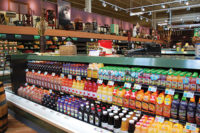But CO2 projects continue to come on line, and that is expected to increase with the recent announcement of UL listing of CO2 as a refrigerant.
According to several industry sources, here are some of the most recent projects.
Winery
One instance was the integration of a CO2 heating and cooling system in a winery in California, where a CO2 heat pump by Mayekawa/Mycom made its U.S. debut.
The system features an electric-driven hot water heat pump that uses CO2 refrigerant for glycol cooling and hot water heating. The winery required 180˚F supply hot water.
Some of the findings, according to a report made by Mark Tomooka of Mayekawa at the ATMOsphere America 2012 conference, were:
• High hot water supply eliminates the use for harsh chemical treatment in wash down;
• Design for off-grid capability;
• System cost is 1.35 times the cost of conventional refrigeration and boiler equipment; and
• Three-year payback.
Bakery
Commercial bakery Country Maid uses a transcritical CO2 heat pump system that simultaneously produces high-temperature hot water for washing baking equipment and air conditioning for employees. This installation is a joint effort between the commercial bakery and EcoThermics Corp., based in Illinois, which has developed the AT54 CO2 compressor that is sized for the U.S. commercial market.
CO2 in heat pumps, in this instance, produce hot water from 120˚ to 190˚F, well beyond the limits of traditional heat pumps. When the system is designed to provide hot water and air conditioning simultaneously, the combined coefficient of performance (COP) can exceed 5.0.
According to presenters at ATMOsphere America 2012, payback is expected in three years or less. They said exceptional energy efficiency makes the system economically competitive with low-cost natural gas water heating.
Dairy Plants
Dairy plants in Quebec, Canada, owned by Fromagerie Polyethnique and Fromagerie Fritz Kaiser, respectively, recently integrated CO2 heat pumps into their operations.
Fromagerie Polyethnique’s motivation was to reduce energy consumption and be more sustainable. After monitoring energy consumption since 2008, the company committed, in 2012, to improve energy efficiency and reduce waste. In this vein, the company installed a new blast cooler with the CO2 heat pump unit for the cheese plant.
Different temperatures were required during the dairy production process. In the first project at Fromagerie Polyethnique, a Mayekawa/Mycom CO2 heat pump provides hot water for washing and chilled water for the maturing room, milk storage, and storage ice bank.
The use of the CO2 heat pump saves an estimated 105,000 liters of propane fuel each year, officials said.
The yearly energy-savings estimation from the second project at Fromagerie Fritz Kaiser was said to amount to about 125,000 liters of propane. However, the comparison of energy consumption before and after the CO2 heat pump was installed is a difficult one, those involved in the project said, as the project involved expansion of the production capacity. The goal of the project was to expand from handmade-type production to a more industrial version while at the same time reducing operational costs.
The CO2 heat pump unit is also used for pasteurization and production processes. One of the main benefits of the CO2 heat pump unit is that it can achieve the high levels of heat required during the production process. The payback period for the project was estimated at four to five years, but thanks to the energy-efficiency incentives by the Quebec government, the payback period was reduced to two years.
Trends
Transcritical CO2 supermarket systems in U.S. supermarkets are trending. At ATMOsphere America 2012, several North American suppliers shared information on CO2 supermarket installations.
Hill Phoenix presenters said the company has 50 secondary CO2 systems installed in North America, more than 25 cascade systems, and recently installed the first transcritical system by Advansor in Vancouver, with additional projects planned in the future. CSC has supplied 18 supermarkets with their ECO2 systems in Canada; and Carnot Refrigeration has supplied five subcritical CO2 supermarket systems, and a total of 23 CO2 transcritical supermarkets in existing or under-construction buildings in North America.
Publication date: 1/14/2013










